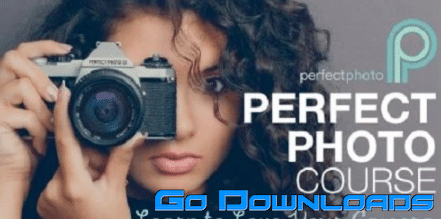Cool
DSLR and Mirrorless The Fundamentals of Photography
I have made learning how to get the best from your DSLR or Mirrorless camera a fabulous experience with easy to follow beautifully animated tutorials. I guarantee you will learn to love photography as much as I do. The Perfect Photo Course will give you a solid understanding of your camera controls and how best to use them. Each camera function is explained in easy to follow modules with lots of example photographs and practical demonstrations.
I have listed the course modules below together with a snippet of what to expect in each. I hope you are excited to begin your photographic journey and you enjoy the course as much as I did in creating it. Please take part in the practical demonstrations and post your photographs too – I would love to see your work.
Best wishes, Frank
-
-
Module 1: What is Exposure?
A photograph is also known as an exposure. To create a photograph we simply expose the camera to light. This simple method of capturing an image has been around for centuries. In this module I will explain the concept of exposure and get you suitably prepared to release your inner creative potential.
-
-
-
Module 2: The Three Elements That Determine Exposure
A well exposed photograph is created by adjusting the three elements that determine exposure. In this module I will introduce you to the three elements – Aperture Size, Shutter Speed and ISO. You journey to unleash your creativity begins by understanding how each element works.
-
-
-
Module 3: The Exposure Triangle
It is a balance of all three elements that helps you to achieve the perfect exposure. In this module we will take a look at how the Exposure Triangle simply illustrates the relationship between the three and that if you make a change to one element you must adjust either one or both of the other two elements.
-
-
-
Module 4: How to Balance the Three Elements
-
Using a fabulous animation I will show you how simple it is to balance the three elements. The animation will enforce the principal that making a change to one element would require you to change one or both of the other two elements. For example – Change the Aperture Size and you would need to adjust the Shutter Speed or ISO or both.
-
-
-
Module 5: Aperture Size
As well as helping to control exposure Aperture Size lets us control Depth of Field which allows us to become super creative. We all love a photograph with a blurry background or a sharply focussed landscape and Aperture size helps us to control the ratio of what is in focus. In this module we will take a detailed look at that range of Aperture Sizes available I will also show you a series of photographic examples each clearly showing the particular aperture size used to create each photograph. The module finishes with a practical demonstration where you can watch me capture photographs using various Aperture sizes and we will compare the results.
-
-
-
Module 6: Shutter Speed
Shutter speed does so much more than just helping to balance exposure. Used creatively we can freeze the action or capture motion as well as capturing the passing of time. In this module we will take a look at the range of shutter speeds available on your camera and when to select a fast or slow setting. I will also show you a series of photographic examples each clearly showing the particular shutter speed used to create each photograph. Finally I will demonstrate the effect of using different speeds in a fun practical demonstration where you can watch me freeze the action and capture motion.
-
-
-
Module 7: ISO
We consider ISO as our method of last resort. We try to keep the ISO number as low as possible to avoid adding ‘digital noise’ Higher ISO values tend to increase the possibility of adding ’noise’ especially in areas of one flat colour. In some instances using a higher value is unavoidable especially in dimly lit environments when slowing the Shutter Speed or increasing the Aperture Size just isn’t possible. In this module we will take a look at a guide to ISO values and I will also show you two images containing heavy ’noise’ and how software helps to eliminate the problem.
-
-
-
Module 8: RAW v JPEG
Your camera can capture images in two file formats, JPEG or RAW. Or you can shoot using both formats simultaneously creating one photograph but two versions. Confused? Don’t worry as in this module I will explain the differences and why professional photographers shoot in the RAW format. JPEG however does have its place but if you are serious about your photography RAW is the way to go.
-
-
-
Module 9: White Balance
You may have noticed a button on your camera with the acronym ‘WB’ This simply means White Balance, which is a measure of colour temperature. Any environment you find yourself in has a unique colour temperature measured in degrees Kelvin. To help you the camera offers a selection of WB presets plus an Auto White Balance ‘AWB’ You can also set a Custom WB. Don’t worry as in this module you will see the AWB does a great job especially when shooting in the RAW format when you can retrospectively change the WB with ease.
-
-
-
Module 10: Camera Modes
In the beginning there was the Auto setting, which of course is a Mode, but one I hope you will forget about. The creative Modes on your camera are far more exciting and in this module we will take a look at the Modes you should be using to shoot better photographs. I will explain the differences between Manual, Aperture Priority, Shutter Priority and Program, which are the four ‘creative modes’ All Modes are accessed via the Mode Wheel on the top of your camera.
-
-
-
Module 11: Camera Controls
The traditional method of changing settings on your camera involves choosing the setting you would like to change and then rotating the Control Wheel. Some cameras have two Control Wheels and some have ’touch screens’ which give you the option to make changes by touching the screen. There is plenty of choice. Your camera also has a comprehensive menu accessed via the ‘Menu’ button. However you will find it much quicker to make changes to commonly used settings using the ‘Quick Menu’ button. All cameras have a ‘Quick Menu’ feature which helps to make speedy changes without visiting the Main Menu. Don’t forget you also have dedicated buttons for functions such as ISO and WB etc. This module takes a look at some typical Control Wheels and Quick Menus.
-
-
-
Module 12: Aperture Priority
In this module I will introduce you to the joys of shooting in the Aperture Priority Mode. I will start with a recap and then go on to capture a selection of photographs at various Aperture Sizes. Blurry backgrounds or all in focus at the spin of a wheel. By simply choosing different Aperture Sizes and letting the camera decide the Shutter Speed and ISO you can begin to explore your creativity, safe in the knowledge the camera is working behind the scenes to ensure you get the perfect exposure. It is a beautiful thing to witness.
-
-
-
Module 13: Shutter Priority
By contrast the Shutter Priority Mode gives you control over the shutter speed leaving the camera to select a suitable Aperture Size and ISO to maintain perfect exposure. In this module I will begin with a short explanation and then move on to capture a selection of photographs at various Shutter Speeds. I will ‘capture motion’ with a slower Shutter Speed to create a dramatic effect as well as ’speeding up’ to freeze the action. The ‘Priority Modes’ are simple to use and allow you to get creative relatively quickly.
-
-
Module 14: The Final Edit
And finally I will show you some basic photo editing using Adobe Lightroom. But I will begin by talking about why we edit photographs and how photographs have always been edited, long before computers existed. Photo editing is a joyous pastime for some but can be tedious for others. Only you can decide, but if you are serious about getting the best from your camera and creating amazing images then trust me, editing is an essential part of the photography workflow




